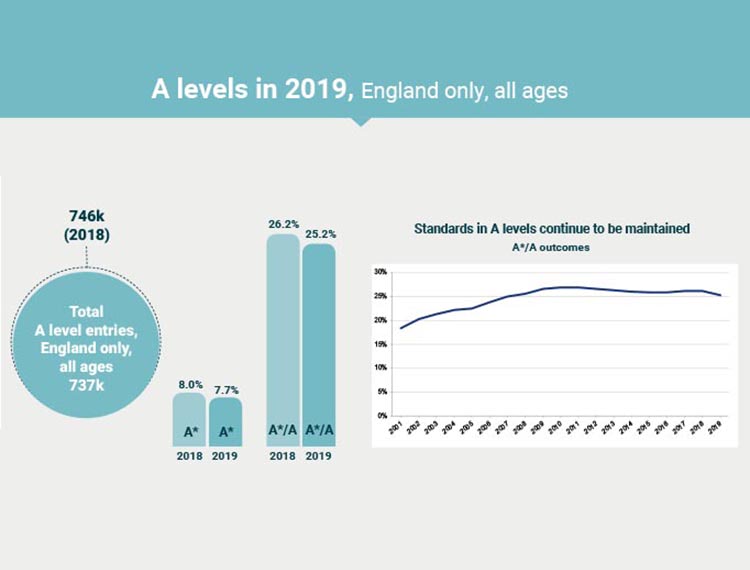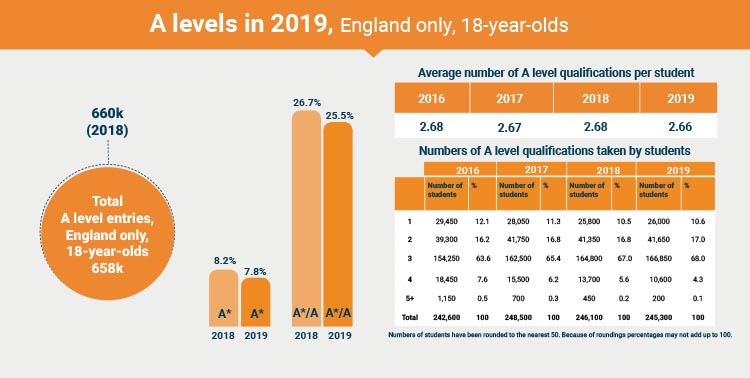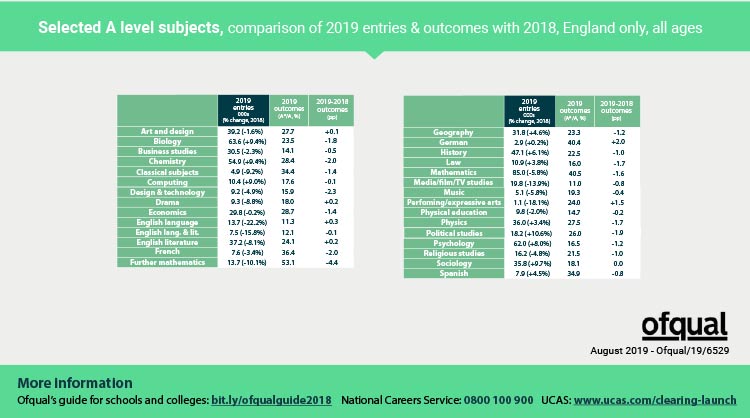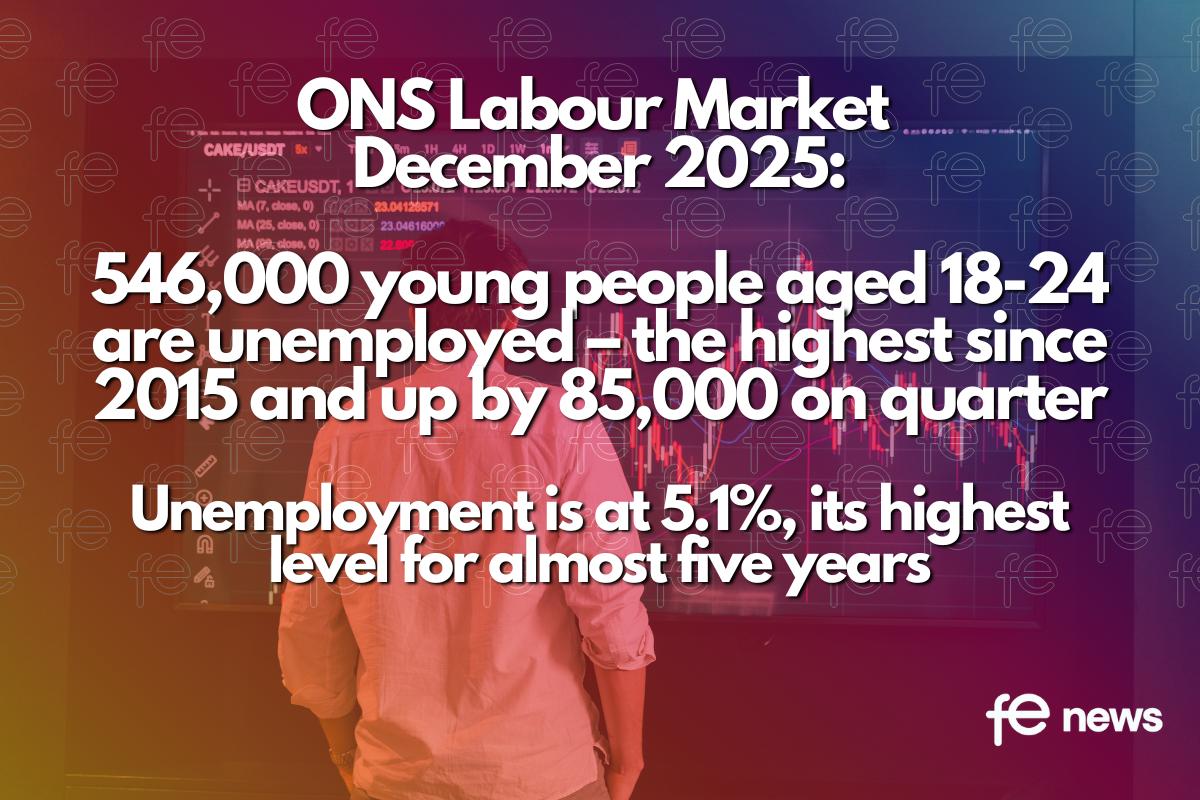Education Secretary wishes pupils and teachers good luck for #ALevelResults2019

Following an emotional morning for students across the country, this year’s A-Level results day proved to be another record-breaking year with the number of female students outnumbering males in A-level science entries. This marks the culmination of decades-long efforts to encourage STEM uptake and marks a landmark moment for the UK tech industry.
Newly appointed Education Secretary Gavin Williamson has wished good luck to the thousands of young people who are set to receive their A level results this morning (15 August).
Many students up and down the country will also have their university offers confirmed, in a year where a record rate of 18-year-olds in England have applied to go onto higher education.
Provisional data published in May showed a total of 745,585 A level entries in England this academic year. That included rises in the number of entries to science courses, as well as rises in computing and history.
- The proportion of women taking Computing has doubled since 2013 but remains unequal (Males: 9649, Females 1475, in 2019).
- There has been a five-year increase in students taking STEM subjects: 9.0%
- There has been a five-year decrease in arts subjects of 20%.
As well as wishing students good luck, the Education Secretary thanked teachers and schools for their hard work and highlighted the better quality choices available for further study.
 Education Secretary Gavin Williamson said:
Education Secretary Gavin Williamson said:
“Everyone receiving results today should feel proud of their achievements – as should the thousands of teachers that supported them in our brilliant schools and colleges. Today marks the culmination of years of hard work which it’s right to recognise at this time of year.
“Of course, the minds of thousands of young people getting their results will soon turn to the next chapter in their lives, whether that’s a place at one of our world class universities, earning on an apprenticeship or entering the world of work – and I hope every one of them is excited about the opportunities that lie ahead for them and I wish them the very best of luck for their results today.”
Prime Minister Boris Johnson said:
“I congratulate everyone receiving their A level results today.
“The new government will do all we can to improve funding for education and to give schools the powers they need to deal with bad behaviour and bullying so that pupils can learn.
“We also must focus much more attention on providing great apprenticeships for all those who do not go to university.”
 Angela Rayner MP, Labour’s Shadow Education Secretary, said:
Angela Rayner MP, Labour’s Shadow Education Secretary, said:
“Congratulations to everyone receiving their A-Level results today.
“And thank you to parents and carers, education leaders and teachers for their hard work in supporting young people through their education.
“We need to give more support to our students, so Labour will abolish predicted grades and implement post-qualification admissions.
“This will allow those studying to make informed choices, and reduce the stress of the transition to higher education.
“Students should be proud of what they have achieved today, and we are proud of them.”
 Bill Watkin, Chief Executive of the Sixth Form Colleges Association said:
Bill Watkin, Chief Executive of the Sixth Form Colleges Association said:
“Our members have delivered another year of outstanding A level results. As large, specialist providers of sixth form education, they lead the way in delivering a broad, high quality education to young people. The decline in entries to English Literature and Language A levels is a concern and is something we must collectively work together to address. It is also important for the government and regulators to develop a much clearer explanation about grade boundaries and how they are set. This week’s controversary surrounding grade boundaries should not overshadow the fact that students are coping extremely well with the new-style A levels where exams are taken at the end of the course, usually after two years.
“However, it will be impossible to maintain these high standards without a serious increase in sixth form funding in next month’s spending review. Additional investment is also needed to keep key subjects on the timetable, offer a wide range of extra-curricular experiences, and provide the essential support activities that students need. Last month, the Education Select Committee joined the Social Mobility Commission and Ofsted Chief Inspector in backing the Raise the Rate campaign to boost sixth form funding in the spending review. The government must wake up to the sixth form funding crisis and significantly increase investment levels to ensure that colleges and schools can continue to provide the sort of high quality education that our young people need to prosper”.
Geoff Barton, General Secretary of the Association of School and College Leaders, said:
“Congratulations to students on their results in A-levels, AS levels and other important vocational qualifications. Congratulations also to the schools and colleges which have so expertly taught and supported them during a period of great change to qualifications and while under severe funding pressures because of government cuts to post-16 education.
“This year is the third phase of the introduction of new A-level exams, including the most popular A-level subject of maths. Students have faced the daunting prospect of going first in new and challenging qualifications which are designed to be more rigorous.
“The grading system addresses these issues by adjusting grade boundaries to take into account changes in specifications and the degree of difficulty in different papers so that students are not disadvantaged from one year to the next. This is a good thing and grade boundaries need to be understood in this context.
“But we are concerned about the impact on young people. The government’s obsession with making exams more rigorous is in danger of destroying their love of learning. Entries to both A-level English and A-level maths have fallen this year following the introduction of tougher GCSEs in these subjects and this should give us all pause for thought.
“We support the idea that qualifications should be challenging, but we do not think they should be grinding. We are not calling for wholesale change of qualifications in the immediate future. There has been far too much recent upheaval.
“But it would be timely and sensible for the government, Ofqual and the exam boards to conduct a review to find out more about the impact on students of the new qualifications and what adjustments might be made to turn down the pressure cooker.”
Eithne Hughes, incoming director of the Association of School and College Leaders (ASCL) Cymru, said:
“Congratulations to students across Wales for the positive results at A and AS level. These outcomes are a credit to the hard work of students, teachers and leaders in schools and colleges across Wales.
“Wales is facing unprecedented changes in policy reforms to the education system within the context of increasingly reduced funding. With 31 reformed A levels being awarded this summer, this has been a tense and challenging period for leaders and students alike.
“For A level results to have reached their best-ever outcome, with 9.1% of grades awarded at A*, is a testament to the resilience of these young people and the quality of our teachers.
“The picture for post-16 students is a positive one in Wales, where there was an increase in achievement at A* – A in English Language, Literature, German, mathematics and Welsh second language. Outcomes in the Welsh Baccalaureate Advanced Skills Challenge Certificate qualification, which is in its third awarding year, are stable at 97.8% A* – E. Results at AS level were also stable. While there was a general decrease in entries, this is on the whole reflective of the population decrease at 17 and 18.
“There is indeed much to celebrate in Wales with this set of results, where we have stability in outcomes, against a backdrop of change and policy reform. Congratulations to all concerned.”
Balance between academic attainment and essential skills crucial for #FutureofEmployment
 Association of Employment and Learning Providers chief policy officer Simon Ashworth said:
Association of Employment and Learning Providers chief policy officer Simon Ashworth said:
“Congratulations to all those students who have worked so hard to give themselves a chance to thrive in a very uncertain climate. The good news is that university, college, an apprenticeship or a job all offer up further opportunities to strengthen their chances.
“AELP’s major concern is that employers would currently like to be offering them up to 25% more apprenticeship opportunities if the funding was available and the shortage is being felt most outside the big cities. Boris Johnson has promised more money and it needs to be pumped in quickly if he doesn’t want thousands of disaffected young people on his hands who are constantly being told that apprenticeships lead them to a bright future.”
 David Hughes, Chief Executive, Association of Colleges (AoC), said:
David Hughes, Chief Executive, Association of Colleges (AoC), said:
“Congratulations to all students receiving their A-Level results today. For many thousands this is an exciting time, preparing to leave home for the first time to take up a place at university or negotiating a place through clearing. Many others will take a different path to progress to their dream career. Further education colleges offer a wide range of options from apprenticeships or higher and technical vocational education to part-time study options that will allow flexibility around other commitments.
“Whatever students choose to do after today, I offer my best wishes and good luck for their next steps.”
“While it is encouraging to see a record number of disadvantaged students accepted to university this year, decline in the take up of A-Level English, languages and music is worrying. We must begin to address the reasons for the continued year-on-year drop, as all provide valuable pathways to future careers and professions.”
 Kirstie Mackey, Head of LifeSkills created with Barclays said:
Kirstie Mackey, Head of LifeSkills created with Barclays said:
“For those students whose results haven’t gone quite as well as expected, working out their next steps may be a stressful and uncertain time. However, while academic results are important, it’s worth remembering that they’re certainly not the be-all and end-all of career success. In a competitive job market, we know that employers are increasingly looking for young people who possess the core transferable skills that businesses are looking for – such as creativity, proactivity and adaptability.
“There are plenty of ways young people can boost these transferable skills. Alongside their studies, engaging in volunteering and community action can be a great way to develop key skills and gain experience that will prepare young people for their future careers. Encouragingly, our own research found that many young people are finding new routes to boost their experience and skills, such as setting up online businesses. It’s experience such as this that can really make a difference in helping young people to strike out on their own and build the key skills that will impress potential and future employers.
“For young people mapping their next steps and looking towards their future careers, here are some top tips to give them the best possible shot at career success:
- Know your skills – Identifying your skills is really important when you’re deciding which career is right for you. Try taking the Barclays LifeSkills Wheel of Strengths test to find out where your strengths lie.
- Do your research – Doing your research is essential as you begin your job search – but you don’t have to do this on your own. Check out Barclays LifeSkills’ online Advice Map, and interactive tool to help you find the right advice from the right places.
- Get interview-ready – Interviewing can be one of the most important (and nerve-wracking) parts of applying for a new job. Use LifeSkills’ Virtual Interview Practice tool to prepare and hone your skills.”
Tom Hadley, Head of Policy and Campaigns at the Recruitment & Employment Confederation, says:
“A Levels can open the door to a great career in a range of exciting sectors like health and social care, and IT which REC research shows have a big demand for staff and skills. Talking to recruitment professionals, who are experts in specific sectors, will help answer some of the big questions parents and students are asking themselves right now.
“Getting your A Levels is a great achievement. Ongoing training and development though is also key to getting ahead, especially if you’re not planning to go to university but are looking at a permanent, part-time or temporary job. Promoting training opportunities to the next generation of workers and entrepreneurs is key.
“There is more the government can do to help with this – in particular, by evolving the current apprenticeship levy into a broader levy that can benefit temporary workers. Huge opportunities for A Level holders to get jobs and provide much needed skills where there are shortages of workers could be opened up if government ends the scandal of locking out those working on a flexible and temporary basis from training opportunities.”
Jane Gratton, Head of People Policy at the British Chambers of Commerce, said:
“Congratulations to all the students around the UK who received their A level results.
“As students contemplate their next steps, it’s important to remember there’s more than one path to success in the world of work. While many school-leavers and their families consider a place in university as the traditional route to a rewarding career, they could be overlooking other exciting, technical avenues for development and progression.
“The new, high quality Apprenticeships allow young people to earn, learn and progress quickly in their chosen career. At a time when businesses are reporting critical levels of recruitment difficulties, employers are keen to help people develop practical experience, skills and qualifications on the job.
“Businesses are working with schools and colleges to help ensure young people are aware of the range of technical and vocational options available to them. The government must work with employers to maximise opportunities for young people to use apprenticeships to kickstart their careers.”
Mark Hilton, Executive Director, Employment and Skills, London First said:
“While many of those getting their A-level results today will be looking to universities for the next step in their education, this isn’t the only option to kick-start a career.
“Vocational routes should provide the same quality of opportunity, but with just eight apprenticeships per thousand working Londoners and a fall of 30% in apprenticeship starts since April 2017, the Government urgently needs to reform the Apprenticeship Levy to make this a reality.
“Business is committed to doing more to help: this November’s Skills London event brings over 30,000 young people together more than 200 employers, colleges, universities and training providers to make life-changing connections.”
Jen May, Customer Experience Officer at REED, said:
“If you’re receiving your A-Level results today, the following weeks will be incredibly important and have the potential to play a critical role in your future. That’s why it is worth considering all of your options in order to choose the best route for your career.
“University will be the right choice for some, but it shouldn’t be the default option for everyone. Whilst employers in some industries consider a degree as a prerequisite, not all careers will require a university education. So it’s important to do your research into the essential attributes and qualifications needed for the job you want.
“You may decide that an apprenticeship or a year in industry is better suited to you. Equipping yourself with important real-life experiences through an apprenticeship can give you a clear head start in working life. With apprenticeships on offer in everything from coding to customer service, you could gain the practical skills employers look for, all whilst avoiding the inevitable debt that comes with a university education.”
Chris Downing, Director of Product Management, Accountants and Bookkeepers at Sage said:
“The working landscape for accountants is changing and for students collecting their A-level results today, the traditional role of the number-crunching bookkeeper has to evolve. Our research found that eight out of ten practices are planning to recruit from non-traditional backgrounds, and six in ten don’t believe traditional accountancy training will be enough to run a successful practice by 2030.
“To gain competitive advantage, firms will need to focus on relationship building, technological literacy, business advisory and project management capabilities. Creative and personal skills in graduates will help their future employers navigate the changing landscape and provide the consultancy that customers desire – so the new crop of school leavers should aim to grow their skills and market themselves on that basis.
“Let’s also not forget that investing in training is key to practices preparing for the next decade. The ACCA is already evolving its qualification to take account of the changing skillset, but as a profession, we also need to think about how we evolve the way we train accountants in a holistic way – understanding how to work with and get the best out of people.”
Rachael Saunders, education campaign director at Business in the Community, said:
“For many, today is a huge day when decisions about university places or further study are made. However, A levels are only part of the picture. Only 40% of 16-18 year old students actually take A Levels, meaning we should celebrate the achievements of all learners, including those taking vocational qualifications, for example.
“While the knowledge that young people will gain through their studies is vital, essential skills such as teamwork, creativity, leadership and problem solving are in danger of being forgotten. These skills are valuable now and will remain vital in the future as a balanced focus between knowledge and skills directly links to the UK’s economic development and productivity.“Employees and students must be supported to build the skills they need now for our changing world of work, and given access to learning that will equip them to develop the skills they need for the future. If businesses are looking for specific essential skills, they need to work with educators using a curriculum that’s relevant to modern life. This will ensure that businesses benefit from the workforce of the future having the skills they need while leading the way in providing good and fair employment opportunities to all, regardless of background.”
More students than ever are achieving #STEM A-Levels
Results show that the number of girls taking science A-levels has overtaken boys for the first time ever. This comes following a major push in recent years to encourage girls to take up science, technology, engineering and maths (STEM) subjects in school.
It is the combined responsibility of the government, education providers and technology companies alike to encourage students from diverse backgrounds to take up STEM subjects at school, thus ensuring that we cultivate the next generation of the IT leaders.
Guita Blake, Senior Vice President & Head of Europe at Mindtree:
“It is fantastic to see today’s A-level results showing more young women pursuing STEM (Science, Technology, Engineering and Mathematics) subjects in their studies. Only by diversifying our workforce can the tech industry continue to develop at the pace required to remain competitive with the rest of the world. With greater visibility for successful women in STEM and with continued encouragement and more education, we can chip away at out-dated biases and create a healthier gender balance in this rewarding and exciting industry.
“It is the combined responsibility of the government, education providers and technology companies alike to encourage students from diverse backgrounds to take up STEM subjects at school, thus ensuring that we cultivate the next generation of the IT leaders. With only 23 per cent of the UK tech workforce currently represented by women, it is our mission at Mindtree to ensure we are working hard to ensure this figure is higher within our European practice and we look forward to welcoming more of these excellent young women to our company as they enter the industry over the next few years.”
Charlie Stripp, MEI Chief Executive and Director of the NCETM, commented:
“Well done to the AS and A level Mathematics and Further Mathematics students (and their teachers!) on their achievements this year. This year’s students are the first full cohort to take the new mathematics A levels, and they were also the first to take the reformed GCSE Mathematics in 2017, so they’ve been the pioneers of the new mathematics qualifications.
“I’m convinced the reformed mathematics A levels will provide a better foundation for university study in STEM disciplines and hope that this year’s small reduction in entries will recover once the new qualifications become more established over the next few years.
“It’s great to see increasing numbers of students gaining a Core Maths qualification – well done also to them and to their teachers. Our interviews with former Core Maths students this year confirm that the skills the students have learned will be useful to them in their future lives and study. Core Maths qualifications are proving their value and numbers should continue to grow strongly.
“The AMSP is ready to help with resources and professional development for teachers of AS and A level Mathematics and Further Mathematics, and for teachers who are already teaching Core Maths or thinking about doing so next year.”
Oliver Presland, Vice President of Global Product Management at hybrid IT managed services provider Ensono said:
“More students than ever are achieving STEM A-Levels, with a 9% uptick in these subjects over five years. Computing has been no exception and it’s especially encouraging to see the proportion of women taking the subject has doubled since 2013.
“However, it’s worth pointing out that in Computing, the gender balance is still highly skewed towards men, with 9649 and 1475 entries for males and females respectively. More will still need to be done in this regard to encourage women into the space.
“With the UK in the midst of a digital skills gap, increased uptake of Computing A-level represents positive news for the industry. Lack of appropriate skills currently presents a major hurdle to business growth and innovation, and has hindered the UK’s competitiveness.
“As the Fourth Industrial Revolution ushers in far-reaching economic and societal changes, the world of work is evolving with new roles demanding new, digital capabilities. Youngsters need to be able to flourish in this dramatically different environment, and students today seem to be acknowledging those changes in the subjects they’re choosing.”
 John Cope, CBI Head of Education and Skills policy, said:
John Cope, CBI Head of Education and Skills policy, said:
“This year’s A-Level results paint a mixed picture. Firms will be reassured by the rise in science subjects – especially among women – and that uptake in modern foreign languages has held. There will be concern however amongst companies about the decline in English and Maths entries.”
On the slight increase in digital subjects, John said: “We are starting to see a long overdue increase in uptake of digital qualifications, such as computing. With only 31% of firms confident they will be able to access the digital skills they need in the next three to five years, we need to keep up this momentum.”
On modern foreign languages, John said: “To meet the Government’s vision of ‘Global Britain’, uptake of modern foreign languages must increase, or the UK will be left behind.
“While entries have held, this isn’t good enough. The Government has rightly recognised this by establishing centres of excellence to promote foreign languages. The next step must be to address the shortage of language teachers across the country.”
On the closing gender gap in science John said: “Historically as a country we have failed to close the gap between boys and girls taking science. Firms will be delighted to see that gap close, with more girls taking up science subjects and performing well.”
Nansi Ellis, Assistant General Secretary of the National Education Union, said:
“The National Education Union congratulates the many thousands of students who have succeeded today in their A-Level and vocational qualifications. It pleases every teacher to see their students prosper and be able to pursue the next stage of their education, whether at university or on an apprenticeship.
“Despite funding cuts, teachers have continued to deliver A-Level and vocational courses of a high quality. This, in spite of sixth form and further education funding being particularly badly hit in recent years. It is imperative that additional investment is made to protect subjects and services. The NEU is a supporter of the Raise the Rate campaign.
“It is good to see that more students are studying Computing, Chemistry and Biology at A-Level, all of which are important subjects to gain access to university or work. It is good that more female students are taking the sciences at A-Level and have overtaken male students for the first time. It is very worrying however, that there continues to be a reduction in the number of students studying the English subjects, down 35%, and that the performing and expressive arts entries have dropped by 53%. Modern Foreign Languages such as French and German also continue to decline.
“If our students are not taking arts, English and humanities subjects to A-Level and on to degree level, what happens to teacher supply in the future? Students should be encouraged to take a mixture of subjects at A-Level, and not be made to choose between the STEM subjects and the arts/humanities.
“Grade boundaries are not static and will change year on year to a greater or lesser extent. Part of that difference is because of the level of difficulty of the questions in the paper, which has always been the case.
“Students have recently been subjected to reformed A-Levels, which take away AS staging and, in many subjects, coursework. They also push students towards a single exam at the end of the course. Our recent survey (1) shows that NEU members have witnessed a very clear worsening in mental health problems among students (55%) since the introduction of new A-Levels, and a third (37%) are convinced that they less accurately reflect a student’s true ability. Today’s results must be considered in this context. We are moving away from a system which engages and encourages learners, and this is having worrying effects on the very people the system is supposed to prepare for the outside world.”
John Abel, VP of Cloud and Innovation at Oracle UK, said:
“Presenting a STEM education as the only path to a career in technology is short-sighted. In recent years, there has been a strong focus on encouraging students into studying STEM as the world continues to become more digital. However, what the technology world really needs is inquisitive, creative minds that can help us to solve some of the biggest problems society is facing.
“Technologists are often structured in the way they think, and while integral, are only one part of the equation. When building a team, we should look less at degrees and experience, and instead focus on finding people with the right mindset. Do they question everything and come up with interesting solutions to problems put in front of them? Whether they have qualifications in History, English, Sports Science, or Media, there is only one question: can they be innovative and navigate through problems to find solutions for customers? That’s the priority.
“Lots of business leaders talk about neurodiversity, but few put it into practice. Diversity in the background of a team brings with it a diversity of mindset, which is key when building a tech team. It will always be true that those who study STEM subjects bring great value, especially in the world of technology. What must be stamped out is the notion that if your studies took you down a different path, you are locked out of a career in the tech sector. If we want to create the best technologies, ones that will have a positive impact on our world, then we need to hire the people who can make this happen – no matter their qualifications.”
Sean Farrington, SVP EMEIA, Pluralsight:
“Over the last year, the UK government has ramped up its efforts to encourage STEM development and learning in our schools. It has invested millions in teacher training through subject bursaries, urged technology companies to partner with schools as part of a £10m edtech fund and this spring committed to an extra £200m to support developments in the STEM industry.
“With today’s results showing that STEM subject uptake is at 41%, with computing growing by 8%, and those achieving A* to C grades in computing reaching 63%, it’s great to see a return on investment and positive engagement in these subjects which will help keep the UK at the forefront of innovation for years to come.
“That being said, there’s still so much more to be done. Deloitte found this year that just 18 percent of business leaders believe that those leaving school have the right digital skills and experience for the workforce. If we want to keep pace with the world’s elite on emerging technologies such as AI and 5G, we must encourage more young people, and in particular girls, to consider technology careers. Just 13% of those taking computing A-level this year were female. A diverse and dynamic workforce is proven essential for greater innovation and creativity, hiring and retaining the best talent and better company performance.
“Of course, an increase in young people studying STEM A-levels is not indicative of them following into an IT career, but it does demonstrate that attitudes towards these industries are changing and individuals are finally realising the potential they can offer – which can only be a good thing for our country. But once graduates enter the workforce the hard work isn’t over. Employers need to continually invest in technology skill development of their workforce to keep them and the country moving forward.”
Federation of Small Businesses (FSB) National Chairman Mike Cherry said:
“This is a crucial time for all students as they make their next steps to higher education which is why the process of university admissions need to serve pupils in the best way possible.
“It’s vital that the admissions system works in the interests of pupils in what is a challenging educational environment.
“The last administration announced that a full review was needed to put an end to some practices which undermined the credibility of the university admissions process.
“First of all, the current system of predicted grades are not sufficiently accurate and should not be used for admissions. Secondly, the use of unconditional offers harms students’ grades and traps them from exploring other options.
“This practice is suitable to only some pupils and universities but not for all. In 2013, only 1.1% of pupils received an unconditional offer, compared to 2018 where a staggering 34.4% did so.
“Gavin Williamson and Jo Johnson must pick up where Damian Hinds left off to create a fair system which doesn’t pressurise pupils into making a decision that can lead to under achievement in exams and have a major impact on their educational and working lives.
“We need this review to uphold the integrity of the higher education system as well as ensuring pupils are able to get the most out of their education.
“And to all pupils, congratulations and well done with your results.”
Ben Lorica, Chief Data Scientist at O’Reilly Media, said:
“Technology will either become our friend or our foe. We must learn to live alongside it if we are to succeed in our daily lives. But how can we ensure that our future generation learn the right skills to become the data scientists that we desperately need today?
“Connectivity, IoT and AI have grown exponentially over recent years, with 84% of enterprises believing that investing in AI will now lead them to greater competitive advantage. This makes it essential for individuals and technologies to work collaboratively to facilitate a cooperative and efficient workforce. With the average shelf life of a skill now less than five years, the need to continually upskill and reskill will become crucial in order to succeed and keep pace with the competition.
“Core subjects such as Maths, Science and English are no longer solely paramount to success. In particular, In recent years there has been a rise in ‘data science’ programmes and machine learning courses at many universities. With other technical skills including machine learning, AI and python all rising in popularity among students, there is no doubt that these skills will dominate the future learning paths and careers of students.
“If technology continues to evolve at this pace, individuals need to learn on-the-go to ensure that their education does not become obsolete. This makes the rise of online training platforms paramount to ensure that an individuals’ skills are kept up to date, whilst simultaneously allowing them to learn new skills from scratch.
“Let this A-level results day serve as a reminder that we need to ensure technology sits at the heart of our training schemes. Then, and only then – will we be equipping the future workforce with the right skills for tomorrow”.
Carol Holden, VP of Human Resources at Software AG, said:
“A-level results day may mark the end of an era – but it’s the start of a new journey too.
“The uptake in STEM grades signals that as students complete their education for the last time, they are becoming more aware of the potential that these kinds of skills have to aid them in a successful future career.
“However, more needs to be done. According to findings from STEM Learning, more than half of businesses expect the STEM skills shortage to get worse over the next decade. This means that businesses need to do more to encourage schools to teach the skills that will be required in the data-driven and analytical roles of the future. They need to democratise their data – and they need people to do it.
“With increasing technological change, job roles are having to adapt to enable businesses to remain competitive. This is because businesses, and society – are increasingly reliant on data to understand the world around them. This is why the next generation of workers needs to be highly skilled in data management. Gone are the days where businesses will be recruiting for just one data scientist. Today – businesses should be recruiting employees with the right technology skills in place that will ensure they are all capable of working with data.
“While STEM skills are important in being able to extract and analyse the data, we want to future proof our workforce by ensuring employees are able to become more creative in their interpretation of the data and that new innovations stem out of our abilities to discover new ideas. By putting data into the hands of the many, employees will have the ability and freedom to derive meaningful information from complex analytical data and reduce an organisation’s reliance on armies of data scientists.
“With Gartner reports shedding light on the need for data and analytics leaders to encourage a data-literate organisational culture that values information as an asset – we must remember that this training begins in schools.
“There are plenty of opportunities for our graduates to go on and thrive – we just need to ensure they have the right skills to work with data”.
Clearing
 Hema Tank, Associate Dean at The London Institute of Banking & Finance, said:
Hema Tank, Associate Dean at The London Institute of Banking & Finance, said:
“Clearing has a reputation as a ‘last resort’ for university applicants who didn’t get the results they were expecting, but that’s changing. While it does serve that function, more and more students are seeing it as an opportunity to give themselves more choice before making a final decision.
“So why should students use Clearing? Maybe they’ve changed their mind about what they want to study, or want to study in a different location. And what if their grades are better than expected? If students didn’t apply somewhere because they didn’t think they’d achieve the grades, Clearing could be their chance to take another look.
“All types of universities and courses are available, so why not encourage them to see what’s on offer. Students can shop around risk-free – any confirmed offer is secure until they accept another offer. So students should use this opportunity to do their research, and get on the phone! And they shouldn’t be nervous about making those phone calls – universities are ready and waiting to help prospective students. Just make sure they have their UCAS number, Clearing number and exam results to hand when they make the call.”
 Vice-Chancellor Anthony Seldon said: “It’s so important to be certain that you’re choosing a course and subject you’re passionate about. It’s not just about the academic benefits of a university, it’s about studying somewhere you can envisage being your home for the next few years. The best advice I can give anyone is to follow your instincts and your ambitions.
Vice-Chancellor Anthony Seldon said: “It’s so important to be certain that you’re choosing a course and subject you’re passionate about. It’s not just about the academic benefits of a university, it’s about studying somewhere you can envisage being your home for the next few years. The best advice I can give anyone is to follow your instincts and your ambitions.
“The clearing process is there to help students who are unsure what to do next. At the University of Buckingham, we’ve seen students go through clearing and then pursue successful careers in a variety of areas. Our two-year degrees continue to be hugely popular as you pay a year less for accommodation and living costs and start work or further study a year earlier than your peers. As the first Positive University in Europe we also find our students appreciate the strong emphasis that we place on wellbeing and more engaged learning.”
English Literature student, Emma Crabree said: “When going through clearing, keep your options open. You don’t need to commit to a specific course – you will be able to discuss multiple courses and choose what you want to apply for. Don’t be afraid to not have answers to certain questions. Taking time with the decision is key, and this is understood at the University of Buckingham.”

This year also sees the continuation of the Government’s reforms to A levels in England, with almost all A level exams sat this summer being reformed qualifications. The new A levels have been updated to provide the best possible preparation for further study and the world of work, with all exams sat at the end of the course. This removes continual testing and enables students to gain a deeper understanding of the subject before they are assessed. The new A levels are designed to have the same level of challenge as the previous qualifications.
Thousands of the pupils getting their results today will go on to do an apprenticeship, offering students high-quality training and a wide range of career options. Apprenticeships now offer more off-the-job training than in previous years and are supported by some of the country’s leading employers, including Lloyds Banking Group, Royal Mail and Berkeley Group.
Many students will also go on to one of the UK’s world leading universities, and the latest cycle of applications show a record rate of disadvantaged 18-year-olds applying to go into higher education. This group were 52% more likely to go to university in 2018 than they were in 2009. This follows the Government’s efforts to improve access and successful participation for those from disadvantaged backgrounds and underrepresented groups, ensuring higher education is open to everyone with the talent and potential to benefit from it.

The Government does not publish any data on A level results days. The first such publication will be A level and other 16-18 results: 2018 to 2019 (provisional), in October.
The Joint Council for Qualifications publish A and AS level results data at 09.30, Thursday 15 August.
UCAS publish universities admissions data at 08.00, Thursday 15 August.
If students, parents or guardians would like advice on next steps after receiving results they can call the impartial, free Exam Results Helpline on 0800 100 900 available from 8 am to 10pm seven days a week.











Responses